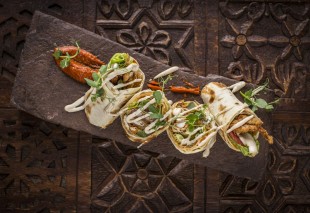

Cuisine focus: MENA

Middle Eastern cuisine is often grouped together as one, though there are many regional nuances within this, and modern as well as traditional approaches. How do you interpret the cuisine?
Ahmed Ismail, executive chef, Royal Catering: Arabic cuisine has a very ‘home-cooked’ feel about it — particularly Emirati cuisine, which is my favourite food to prepare. Because the food reflects the culture’s traditions and history, it is always presented more as a traditional dish, but depending on our client preferences and the type of function we are catering for, we may sometimes modernise certain elements, for example in the way it is served.
Mohannad Al Shamali, head chef, Qbara: To create our modern approach to Arabic cuisine we combine Western ingredients with Arabic ingredients and spices and use modern cooking methods, such as sous vide. We also use a refined way of plating our dishes to give them a modern look. It works because it is unique.
George Razzouk, executive chef, Kababji UAE: Kababji has adhered to tradition in the serving of Lebanese grills but the concept is brought up-to-date with the chain’s open kitchen, charcoal grill and brick oven concepts. Kababji wanted to focus on authentic Lebanese food with an emphasis on product freshness, healthy cooking, and meticulous preparation techniques — hence its traditional menu approach. The modernisation comes from the restaurant chain’s chic wood and stainless steel-clad outlets which are now as famous for their unique style as they are for their hospitality.
Bilal Saleh, head chef, Olea Restaurant: Growing up in a Levantine cuisine culture, I have always kept the traditional methods of cooking, but have developed new modern and interesting ways of serving. I believe it is vital to keep the original ingredients and taste, as these make our dishes authentic, but in order to keep things fresh, we have created interesting methods of presentation that look impressive, without changing the taste.
Michel Aramouni, founder and owner, Boubouffe Lebanese Brasserie: BouBouffe Lebanese Brasserie is known for its traditional dishes and I decided to keep it that way in order to preserve the authentic Lebanese flavours for the current and next generations. It is important to note, however, that the ‘brasserie’ concept is generally based on the fusion of authentic, local food with a variety of international dishes in one menu. In this aspect, BouBouffe is unique and serves authentic Lebanese cuisine with a variety of international dishes – all with our own little twist, of course.
Wafaei Al Zaham, Arabic chef de cuisine, Atayeb: Yes indeed we have modernised the cuisine by offering a varied selection of Moroccan, Tunisian, Lebanese and Syrian [dishes] with a modern flair, all on the same table.
As your cuisine is regionally inspired, are you able to use local produce?
Al Shamali: We try, where possible, to use local products, but sometimes we have to import products due to the desired quality or if it is unavailable in the region. Our spices and herbs are mostly available in the region but for our meat and fish we generally import them.
Saleh: We mainly rely on local resources for the meat and all of our vegetables are grown locally and organically, which I believe is the secret behind their delicious, fresh taste. Everything else is imported.
Aramouni: In Lebanon, BouBouffe is known for choosing fresh and high-quality Lebanese seasonal products as the Lebanese soil offers a huge variety of rich products, especially fruits and vegetables. In the UAE, some of the products we use are sourced locally, while others are imported from Lebanon, such as our secret Chawarma spices.
Al Zaham: Atayeb offers a wide range of Eastern Mediterranean and North African food, not only local dishes. Nowadays in the UAE, local products are available all year round, so we don’t rely on importing them.
This includes different types of vegetables, organic products, honey, poultry and dairy, lamb and camel, etc.
Ismail: We source all basic ingredients from across the Emirates —especially the meat, as it is very good quality. Other ingredients might come from abroad, but generally, we find everything we need in the Emirates, as they are all ingredients used in Emirati cuisine.
Razzouk: All our meat and vegetables are sourced from the best local produce available. We do, however, source a special mix for hummus, pickles, summac, tehina for moutabal and mohalabia from Lebanon.
What trends have you observed in the cooking and presentation of Middle Eastern cuisine in recent months, and what do you predict for 2016 for the cuisine?
Razzouk: With the UN’s declaration of 2016 as the International Year of Pulses, we anticipate an upswing in demand for certain Lebanese dishes and the emergence of hummus as a superfood.
Al Shamali: I feel that chefs are taking a more modern approach to Arabic dishes as well as experimenting with fusions of different cuisines with Arabic cuisine. While it is on the rise I do feel that sometimes people can overlook a fundamental but basic point — the Arabic taste.
Ismail: Ouzi, camel and local sweets are growing in popularity, and we expect this trend to continue in 2016.
Saleh: We expect that the presentation of Levantine cuisine will become more theatrical, as restaurants are constantly competing to present more innovative and unique concepts that can be reflected in the serving of the plates.
Meet the Experts
Wafaei Al Zaham, Arabic chef du cuisine, Atayeb, Yas Viceroy Abu Dhabi
Michel Aramouni, founder and owner, Boubouffe Lebanese Brasserie
George Razzouk, executive chef, Kababji UAE
Mohannad Al Shamali, head chef, Qbara
Ahmed Ismail, executive chef, Royal Catering
Bilal Saleh, head chef, Olea Restaurant, Kempinski Hotel Mall of the Emirates